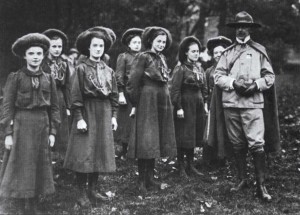
In 1908 Vane inherited a baronetcy, but this did nothing to dilute his radical social views. He continued to advocate socialism, pacifism, women’s suffrage and Irish Home Rule. Interested in the nascent Boy Scout movement, which he saw as an ideal vehicle to transcend national and class divisions, he became London commissioner in Baden-Powell’s Boy Scouts Association. He distrusted Baden-Powell’s militarist leanings, however, and was dismissed in 1909. Vane then accepted an invitation to become president of the British Boy Scouts, which had seceded from Baden-Powell’s movement, and also founded scouting movements in Italy and France, which he sought to unite in the Order of World Scouts, the earliest international scouting organisation. Believing that scouting was eminently suitable for girls, he also encouraged the formation of troops of girl scouts.
There was something of the knight errant about Vane (he even bore a physical resemblance to Don Quixote), and when in 1913 the feminist Sylvia Pankhurst called for a military man to help drill her East London Federation, Vane responded and assumed the title of ‘Leader’ of her ‘People’s Army’. They had sharply different ideas, however, and fell out badly. He continued to take a strong interest in Irish matters, and his encouragement to Dublin workers to defend themselves against police attacks contributed to the formation of the Irish Citizen Army in November 1913. On the outbreak of war in August 1914, Vane volunteered for service, despite his pacifism. He was convinced that the war would be long and bloody but believed that he had a patriotic duty to fight and blamed ‘some sort of devilment in my blood’.
In September 1914 he was commissioned major in the 9th Battalion of the Royal Munster Fusiliers. Vane was particularly pleased to serve in an Irish regiment, enjoying the familiarity and good humour of the men, which intensified his sense of Irishness and commitment to Home Rule. He was described at this time as having a rather flushed face (he was said to be fond of his whiskey and soda) and a ‘dogged, buccaneering expression. He walked with a slight poke of his head forward, had a habit of linking his hands together behind his back, and carried a … swagger stick under his arm’. He addressed public meetings throughout Ireland (including large gatherings of Redmondite National Volunteers), stressing his nationalist credentials and encouraging men to enlist to ensure the introduction of Home Rule and to honour Ireland’s martial tradition. Vane was dismayed, however, by the anti-Irish spirit of the military authorities and their reluctance to create specifically Irish units with Irish emblems, which he believed undermined his efforts.
